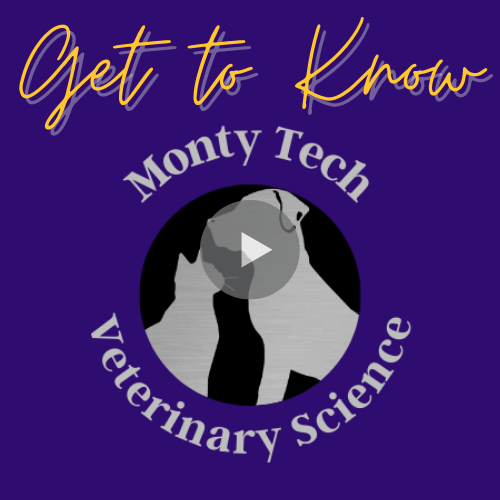

-
Students enrolled in the Monty Tech Veterinary Science program will understand the fundamentals of animal science, be introduced to a variety of species, breeds, and characteristics of both large and small animals. They will compare animal anatomy and physiology, research animal disease and prevention, and study genetics, breeding and reproduction of domestic animals. Working and learning in the school’s Veterinary Science Training Center and Community Clinic, these students will be introduced to all aspects of a comprehensive veterinary medicine practice, and will earn college credits and industry-recognized certifications throughout the course of study.
In addition to studying the veterinary sciences, students in their Sophomore year of study will also develop skills necessary to work in the pet grooming industry. The on-site clinic is also home to a grooming salon, which will serve as a training site for students as they brush and bathe dogs, safely store and maintain all grooming equipment, perform specialized cuts, and demonstrate advanced animal grooming skills.
Students in their Junior and Senior years will work side-by-side with veterinary technicians and veterinarians in the school’s on-site small animal veterinary clinic, where they will demonstrate to take a thorough history from a pet owner, safely restrain animals, prepare vaccines, process laboratory specimens and excel at maintaining comprehensive patient medical records. They will observe surgical procedures, fill prescriptions and position patients for a variety of radiological procedures. In addition, Juniors and Seniors will work closely with the Veterinary Clinic Office Manager, developing skills such as scheduling appointments, maintaining inventory, admitting and discharging patients, handling payments and communicating professionally with clients and industry professionals.
Program graduates will be prepared for both college and career pathways upon graduation. Because the field of veterinary care is so broad, career pathways and required training associated with the selected pathways vary greatly. As a result, students entering the workforce may pursue a number of occupations, either after high school or by completing higher educational programs, that include:
- Administrative Support in Clinics and Hospitals
- Animal Care Technicians
- Groomers, Dog Trainers, Horse Trainers
- Shelter Medicine and Animal Care
- Veterinary Assistants and Veterinary Technicians
- Laboratory Animal Medicine and Animal Care
- Disaster Animal Response Team
- Animal Lawyer, lobbyist or Animal Related Criminal Justice
- Food Safety Inspectors
- Animal Agriculturalists



